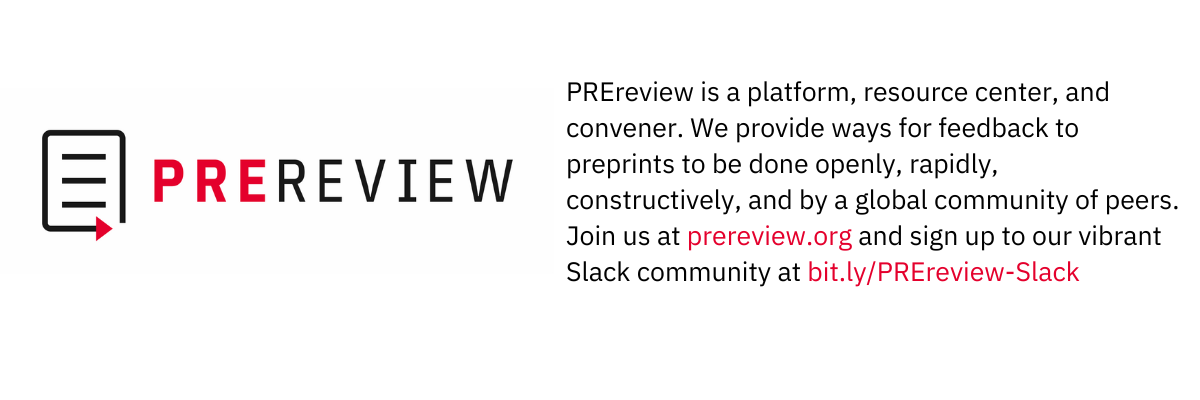In this special guest blog piece, PREreview Champion, Ebuka Ezeike discusses the benefits that collaborative peer review can bring and how it has the potential to accelerate scientific progress and foster a more open and supportive research environment.

In the world of science, getting a research manuscript published, whether in a journal or on a preprint server, is a major milestone. Either before or after publication, there is often a peer-review process where authors get vital feedback on their work to ensure it is accurate, significant, and original. Traditionally, this review process is done by individual reviewers, selected opaquely by editors, prior to publication. This can be a lengthy and slow process where the feedback received is not always the most constructive or helpful in improving the manuscript. However, preprints and open peer review of preprints allow the early sharing of research outputs at a time when feedback is most useful and improvements can be made to the work. This earlier review combined with a collaborative approach to giving feedback can not only speed up the peer-review process, but also provide much higher quality feedback, minimize bias, and open up the peer-review process to those who have been traditionally excluded from it.
What is Collaborative Peer Review?
Collaborative peer review involves multiple reviewers working together to evaluate a research paper. Instead of working in isolation, these reviewers discuss their thoughts and feedback openly, sharing their insights and concerns with one another. This team effort can lead to a more thorough and balanced assessment of the research.
The Benefits of Collaborative Peer Review
Higher Quality Feedback
When reviewers collaborate, they can build on each other's ideas. One reviewer might notice a flaw in the methodology, while another could suggest a way to fix it. By combining their expertise, reviewers can provide more comprehensive and constructive feedback to the authors. This helps improve the overall quality of the research paper.
Reduced Bias
Every reviewer has their own biases, whether they are aware of them or not. By working together, reviewers can help each other recognize and mitigate these biases. Collaborative peer review encourages diverse perspectives which can lead to a more objective evaluation of the research.
Faster Review Process
Collaborative peer review can speed up the review process. Since reviewers are working together and discussing their feedback, they can often reach a consensus more quickly than if they were working alone. This means that research findings can be published and shared with the scientific community faster, accelerating the pace of scientific discovery.
Mentorship and Learning
For researchers of all levels, but particularly early-career researchers, participating in collaborative peer review can be a valuable learning experience. By working alongside more experienced reviewers, they can gain insights into the review process and improve their own reviewing skills. Even experienced reviewers have often received no formal training in conducting peer review and so can learn a lot from those who bring fresh insights and ideas to the process. This mentorship aspect helps build a stronger, more knowledgeable community of researchers.
Improved Research Transparency
Collaborative peer review promotes transparency in the research process. Reviewers' discussions and feedback can be made available to the authors and, in some cases, to the public. This openness helps build trust in the research findings and the review process itself. For example, during PREreview’s Live Reviews, authors are invited to join to listen to the discussion and find this a very valuable form of feedback.
The Role of PREreview.org
PREreview.org is a platform that supports and facilitates collaborative peer review, especially for preprints, which are early versions of research papers shared before formal peer review. PREreview’s Live Reviews are a way in which researchers around the world can come together to discuss and review preprints openly, in real-time, usually via video conferencing software such as Zoom. After the Live Review call, participants have the option to help compile the notes of the discussion into a final review to be published on PREreview.org. This review then receives a DOI via Zenodo along with an Attribution 4.0 International (CC BY 4.0) license. Participants can also choose between not being credited for the review, being listed as a discussion participant, or, if they help compile the final review, as a review author with the opportunity to add this public review activity to their ORCID profile building greater visibility and recognition of this work.
Additionally, reviewers can form a PREreview Club, or join an existing Club. PREreview Clubs are collaborative preprint reviewing groups around a shared affiliation, affinity, interest, location, or any other common cause. Club members work together to give preprint authors timely, constructive peer feedback. Anyone who wants to form a collaborative preprint reviewing group can ask to start a Club. Club leads manage membership of their club, ensuring that all members have an ORCID iD and a PREreview account so they can also be credited for their review activity, with the option to be credited via a pseudonym if they so wish.
This community-driven approach helps ensure that high-quality research gets the recognition it deserves and that researchers receive valuable feedback early in their work.
In Summary
Collaborative peer review is transforming the way scientific research is evaluated and shared. By bringing reviewers together to discuss and assess research papers, we can enhance the quality of feedback, reduce biases, speed up the review process, and promote transparency. Platforms like PREreview.org are leading the way in making collaborative peer review a standard practice, ultimately benefiting the entire scientific community.
By embracing collaborative peer review, we can ensure that the research that gets published is not only rigorous and credible but also inclusive of diverse perspectives and insights. This transformation has the potential to accelerate scientific progress and foster a more open and supportive research environment.
About the author

Ebuka Ezeike is a physicist from Nigeria and PREreview Champion. He currently works with AfricArxiv as the project manager, overseeing a number of projects designed for the discoverability of research works from and about Africa.
Stay connected
You can follow us on X (formally Twitter), Mastodon, BlueSky, and LinkedIn, and keep up with all the latest news by subscribing to our newsletter.
If you would like to contribute a blog post to PREreview, please reach out to Vanessa Fairhurst on Slack or email community@prereview.org with your ideas!
